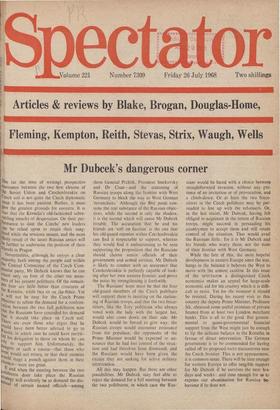Mr Dubcek's dangerous corner The (at the time of writing)
prospective encounter between the two first elevens of ,!he Soviet Union and Czechoslovakia on czeeh soil is not quite the Czech diplomatic eQup it has been painted. Rather, it must give the greatest grounds for concern. It is irtie that the Kremlin's old-fashioned sabre- rattling smacks of desperation. On their per- !ermance to date the Czechs' new leaders .can be relied upon to retain their sang- froid while the tensions mount, and the most likely result of the latest Russian antics will De further to undermine the position of their friends in Prague. Nevertheless, although he enjoys a clear illajority both among the people and within the Central Committee of the Czech Corn- tlionist party, Mr Dubcek knows that he can e,ount only on four of the other ten mem- pets of his present politburo. Of the remain- 'F four four are little better than creatures of .the Kremlin, while two sit on the fence. Yet ,.tt will not be easy for the Czech Prime Minister to refuse the demand for a confron- itaLtion between the two full politburos now :gat the Russians have conceded his demand !11:lat it should take place on Czech soil. _here are even those who argue. that he hwould have been better advised to go to r‘lissia, in which case he could have restric- ..eci his delegation to those on whom he can ei.5f to support him. Unfortunately, the gers of such a course—that those who ;exit would not return, or that their enemies k°_tild stage a putsch against them in their u8.e.tice---vvere too great. 1„1 and when the meeting between the two t atburos does take place the Russian r.ategY will evidently be to demand the dis- Issal of certain named officials—among them General Prchlik, President Smrkovsky and Dr Cisar—and the stationing of Russian troops along the frontier with West Germany to block the way to West German `revanchists.' Although the first point con- tains the real substance of the Russian objec- tives, while the second is only the shadow, it is the second which will cause Mr Dubcek trouble. The accusation • that he and his friends are 'soft on fascism' is the one that his old-guard enemies within Czechoslovakia can find it respectable to support, whereas they would find it embarrassing to be seen supporting the proposition that the Russians should choose senior officials of their government and armed services. Mr Dubcek is likely to counter with an assurance that Czechoslovakia is perfectly capable of look- ing after her own western frontier. and prove the point by strengthening it forthwith.
The Russians' hope must be that the four old-guard members of the Czech politburo will support them in insisting on the station- ing of Russian troops, and that the two fence- sitters, like the Tory politician who always voted with the lady with the largest hat, would also come down on their side. Mr Dubcek would be forced to give way; the Russian troops would encounter resistance from the populace; the opponents of the Prime Minister would be expected to an- nounce that he had lost control of the situa- tion and had therefore been dismissed; and the Russians would have been given the excuse they are seeking for active military intervention.
All this may happen. But there are other possibilities. Mr Dubcek may feel able to reject the demand for a full meeting between the two politburos, in which case the Rus- sians would be faced with a choice between straightforward invasion, without any pre- tence of an invitation or of provocation, and a climb-down. Or at least the two fence- sitters in the Czech politburo may be per- suaded to line up with the reformers. Or, in the last resort, Mr Dubcek, having felt obliged to acquiesce in the return of Russian troops, might succeed in persuading his countrymen to accept them and still retain control of the situation. That would avail the Russians little: for it is Mr Dubcek and his friends who worry them, not the state of their frontier with West Germany.






































